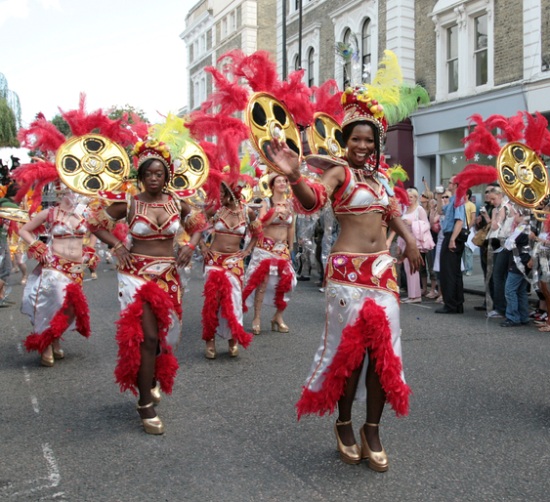This weekend the streets of West London will be transformed by a mass of colourful sights and uplifting sounds as the annual Notting Hill Carnival gets underway. The event first took place in 1964 as a celebration of Afro-Caribbean culture and today attracts over a million visitors every August bank holiday weekend, making it the largest street festival in Europe.

The origins of the carnival lie in Trinidad and music is central to the event. Throughout the weekend, revellers can enjoy a variety of steel bands, calypso and soca alongside contemporary sounds like R&B, funk and house. In addition an array of street stalls provides a mouth-watering selection of traditional Caribbean food including jerk chicken and curried goat.
The highlight of the carnival is the glittering parade which winds its way through the densely packed streets from Great Western Road to Ladbroke Grove on Monday. However, families with children are more likely to attend the event on Sunday when there is a choice of family friendly entertainment on offer.
The Notting Hill Carnival is not a commercial event and is largely run by volunteers but, nevertheless, it generates significant opportunities for local traders and retailers over the course of the weekend. The street stalls themselves are always busy and are staffed by a mixture of regular market traders, those who set up stalls on an occasional basis and others who do so exclusively for the carnival.
In addition to the income generated in this way, local businesses also benefit during the festivities. Previous studies into the economic impact of the event reveal that, while some commercial property based businesses close over the carnival weekend, those that remain open enjoy a healthy increase in turnover. Those experiencing significantly improved trading patterns are a mix of leisure and retail outlets.
In particular pubs, restaurants and cafés find their tills ringing during the carnival, along with fast food takeaways, off-licences, newsagents and grocery shops. These types of businesses almost unanimously report higher sales during the carnival than over a normal weekend trading period. Two thirds of businesses surveyed believed turnover increased by at least 50 per cent, with 5 per cent reporting a doubling of sales.
Overall, including merchandise, security, licenced trading and commercial property based businesses, the Notting Hill Carnival is thought to contribute over £90 million annually to the London economy. This year, of course, it follows the Diamond Jubilee celebrations and London 2012, and takes place just days before the opening of the Paralympics, adding to a colourful and profitable summer for the capital.
Previous Post
Sales of Small Commercial Buildings in USA on the Rise